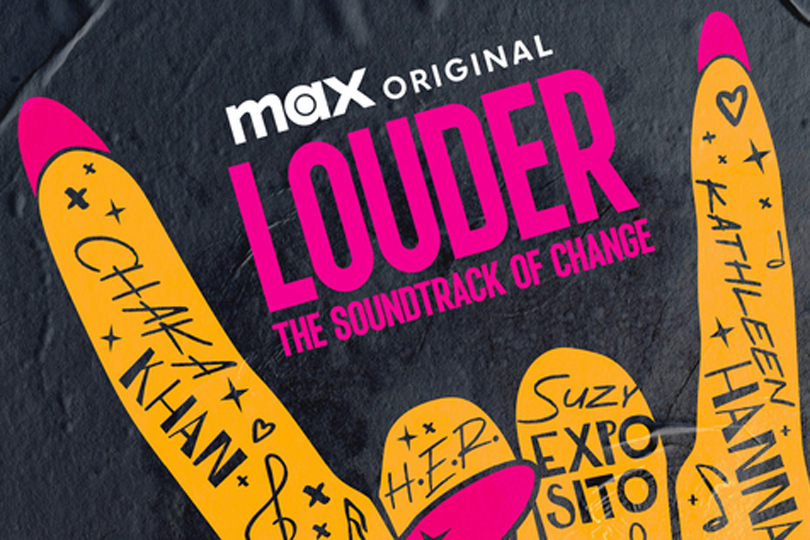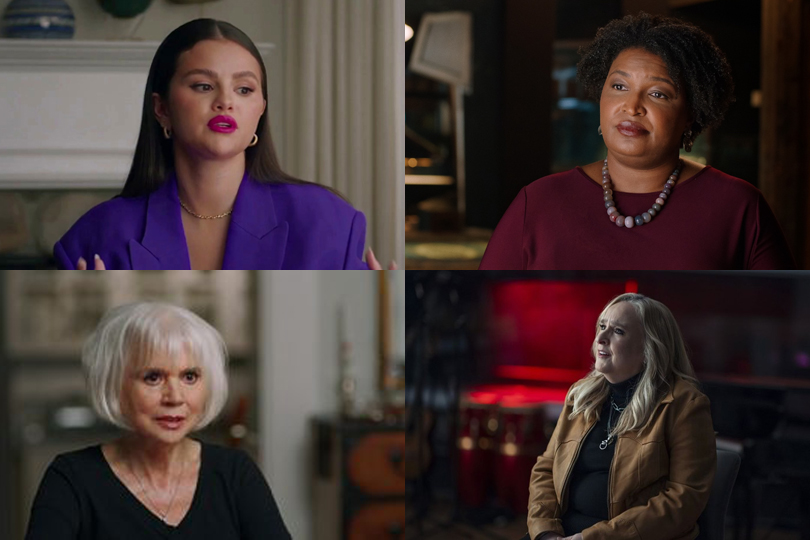By Michele Yeo
“Women have used their music as a form of resistance for decades,” says Selena Gomez in Louder: The Soundtrack of Change, “taking risks, singing the truth. When the world is telling you to shut up, I think music is one of the most powerful ways to put a message out there.”
The hour-long documentary is co-produced by Gomez and activist, author, and former Georgia house representative Stacey Abrams. Now streaming on Crave and Max, it’s a celebration of women in music who have used their voices to speak out on issues, like gender equality, civil rights, racism, and other important issues. “My mission, my work, is to amplify voices that are marginalized and empower people to organize around their beliefs,” says Abrams, “music can do the same thing.”
The doc hears from artists like H.E.R., Melissa Etheridge, Chaka Khan, Linda Ronstadt, Riot grrrl pioneer Kathleen Hanna, as well as pop culture experts, music writers, and also features archive footage and interviews from trailblazers from the ‘60s, ‘70s, ‘80s, and ‘90s. It’s also part history lesson as groundbreakers like Linda Martell, the first woman of colour to perform at the Grand Ole Opry and find success in the country music genre are given her flowers and we’re given the tragic backstory of Nina Simone’s protest song “Mississippi Goddam.” “I never intend for my children to look at me and be ashamed and say, mama, why didn’t you do something, I will have done mine,” says the singer in an archive interview.
H.E.R. recounts how the murder of George Floyd by Minneapolis police officer Derek Chauvin and the subsequent galvanization of the Black Lives Matter movement inspired her to write her song, “I Can’t Breathe.” “I was in the Bay area at my mom’s house and I was seeing people marching outside and on the news and on social media and I had to turn it off because you’re just watching that video over and over again and it’s really painful.” She picked up her guitar and a protest song came out. “I think when we create music it can be more selfish and then it turns into something else I’m not thinking millions of people are going to hear this”
Attention is also paid to revolutionary moments in pop music, like Madonna’s early AIDS advocacy, and in hip hop like Salt-N-Pepa’s 1992 song, “Let’s Talk About AIDS”, a reworking of their hit “Let’s Talk About Sex” meant to clear up common misconceptions about the disease.
While the documentary is an celebratory ode to women musicians past and present, it’s also a rallying call for future artists, particularly as the United States heads into a crucial election and part of the world are turning back the clock on certain issues like voting rights, reproductive freedom, and LGBTQ2+ equality. “The 30 years I have traveled since I came out have been amazing as I have seen the world change,” says Melissa Etheridge, “ but today it seems like things are going backwards.” “These aren’t single issues, these are things that connect all of us,” adds Kathleen Hanna, “young women are such a vital part of changing the world.” Says Abrams, “if we fight, if we resist, we can have more, and this music reminds us that we have been here before, we have pushed through and we will do so again.”

Louder: The Soundtrack of Change is a celebration of music and rallying cry across generations, genres, anchored by female icons whose songs and activism inspired the fight for equality, empowering all. The documentary is streaming now on Crave in Canada












